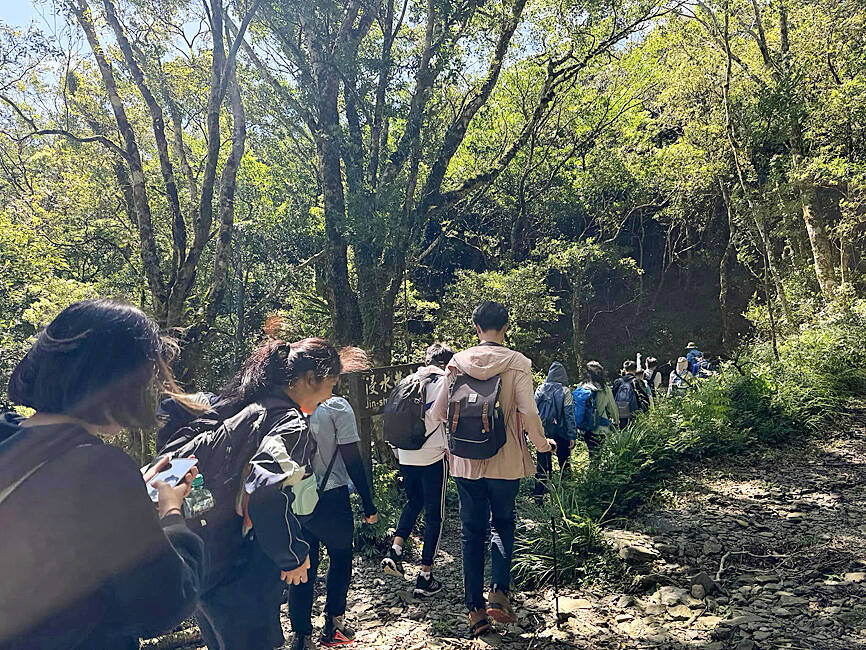A man in his 40s died early yesterday after he was attacked by a swarm of hornets when guiding a group of high-school and university students on a hike on a section of the Jinshuiying Old Trail in Taitung County the previous day.
Taitung Mackay Memorial Hospital said the 41-year-old, identified as Hung Wei-yen (洪偉彥), who sustained more than 50 stings on his back, was pronounced dead at about 2am after efforts to resuscitate him failed.
On Thursday afternoon, Hung and the group of 20 students were 2.5km away from the trail exit near the indigenous village of Qaljapang in Dawu Township (大武) when they encountered a hornet nest, the Taitung County Fire Department said.

Photo from Legislator Chung Chia-pin’s Facebook page
All of the students made it past the nest, but two sustained minor injuries due to stings and were taken to a hospital for treatment.
The students said that after reaching a safe distance they immediately contacted the fire department for help because they were unable to get back to Hung, who was lying on the ground and was surrounded by hornets.
Hung had instructed the students to run past the nest quickly while he stayed behind to try to shoo the insects away, the students said.
The department’s rescue team said they reached Hung at about 7pm and injected him with three doses of a cardiac stimulant as he was unable to move.
Despite having a low blood oxygen level, Hung was still conscious when he was taken to the Dawu Health Center, rescuers said.
However, his condition quickly deteriorated, and he was transferred to Mackay hospital, where he was pronounced dead.
The group began hiking the trail from the Pingtung side and were supposed to end their hike at about 6pm in Taitung, Democratic Progressive Party Legislator Chung Chia-pin (鍾佳濱) said.
Hung was the deputy chief of Chung’s service office in Pingtung who volunteered to take the students on the trip.
Thursday’s hike was part of an event organized by Chung’s charitable education foundation, which organizes field trips for local students to reward them for having good grades.

The Chinese military has built landing bridge ships designed to expand its amphibious options for a potential assault on Taiwan, but their combat effectiveness is limited due to their high vulnerability, a defense expert said in an analysis published on Monday. Shen Ming-shih (沈明室), a research fellow at the Institute for National Defense and Security Research, said that the deployment of such vessels as part of the Chinese People’s Liberation Army (PLA) Navy’s East Sea Fleet signals a strong focus on Taiwan. However, the ships are highly vulnerable to precision strikes, which means they could be destroyed before they achieve their intended

About 4.2 million tourist arrivals were recorded in the first half of this year, a 10 percent increase from the same period last year, the Tourism Administration said yesterday. The growth continues to be consistent, with the fourth quarter of this year expected to be the peak in Taiwan, the agency said, adding that it plans to promote Taiwan overseas via partnerships and major events. From January to June, 9.14 million international departures were recorded from Taiwan, an 11 percent increase from the same period last year, with 3.3 million headed for Japan, 1.52 million for China and 832,962 to South Korea,

SOVEREIGNTY: The rigs show that Beijing ‘rejects Taiwan’s jurisdiction’ by building in areas where Taipei demands permission to build or alter installations Chinese oil rigs have been sighted just 26 nautical miles (42km), from Taiwan’s exclusive economic zone (EEZ) near Pratas Island (Dongsha Island, 東沙島), posing a threat to Taiwan’s sovereignty if left unchallenged, a brief published by the Jamestown Foundation on Tuesday said. Pratas Island, 444km from Kaohsiung, is northeast of the South China Sea and houses a Taiwanese garrison. The brief, titled “Rigging the Game: PRC Oil Structures Encroach on Taiwan’s Pratas Island” — referring to the People’s Republic of China — analyzed photographs and said that Beijing’s tools to pressure Taiwan now include oil rigs. “Oil rigs now constitute part of Beijing’s

The Taiwan Experience Education Program (TEEP) has funded short-term internships in Taiwan for more than 4,500 young people from more than 40 countries since 2015, with the goal of attracting and retaining international talent, the Ministry of Education said yesterday. Fifty-five colleges launched 514 projects this year, including in fields such as semiconductors, artificial intelligence, medicine and biotechnology, green energy, and sustainability, it said. The program provides research and practical internships in Taiwan for two to six months, and offers cultural exchange and networking opportunities, the ministry said. For example, National Formosa University’s Embedded System and Autopilot Laboratory developed two solar-powered drones in